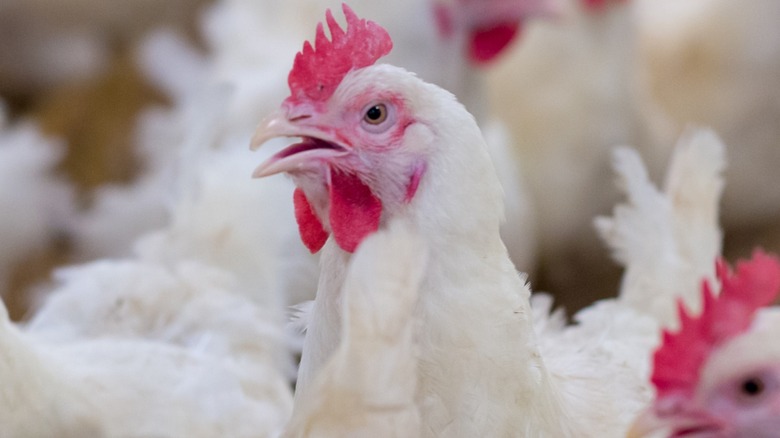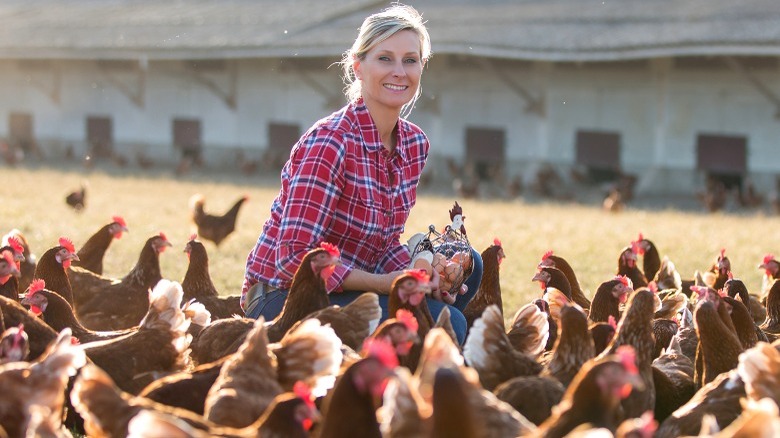Could A Bird Flu Shot Someday Be On Your Vaccine Checklist?
Just as we're emerging from the worst of COVID, it now seems another virus is beginning to raise concerns within the worldwide medical community.
Bird flu, or avian flu, is what it sounds like: a type of highly contagious influenza that infects birds and spreads among the avian population. However, more recently, birds have been transmitting the disease to mammals — and at an alarming pace. A couple of examples that elevated worries among experts include the spread of bird flu among a seal population near the Maine coast in the summer of 2022, followed by an outbreak on a mink farm in Spain in the fall, per The New York Times. Consequently, studies and surveillance are ongoing to determine if these types of infections are transmitted from bird to mammal or between infected mammals, how the disease mutates and adapts in mammals, and how efficiently it spreads.
Though rare, bird flu can also infect humans, and so medical experts are keeping a watchful eye on this unprecedented bird flu outbreak, along with human cases. The Centers for Disease Control and Prevention (CDC) announced in February the first two human cases of bird flu since 2014 were reported in Cambodia, including a child who died and an adult who reported coughing and fever. Investigations of these two instances are underway, with health and science experts implementing monitoring, contact tracing, and other strategies to determine the origin of these two cases and assess whether additional bird flu cases may be circulating.
Why health officials are concerned about bird flu
The World Economic Forum explains that bird flu is a respiratory disease that spreads via bird droppings, saliva, or contaminated food and water. The disease is ultimately deadly to birds, especially domestic birds such as chickens, turkeys, and geese, but wild birds are increasingly becoming infected and contributing to the spread.
Even so, bird flu is not a new phenomenon. Twenty-one countries have reported 860 cases of bird flu in humans since 2003. Though there are several bird flu strains in circulation, the strain that has experts the most worried is H5N1, which first emerged in China in 1996. However, because the H5N1 bird flu strain has crossed over to other animal species, Dr. Shyam Bishen, Head of Health and Healthcare at the World Economic Forum, stated that there is a possibility of this strain mutating and becoming more infectious in humans. While acknowledging that the present risk to humans remains low, she emphasized the importance of the science community keeping a close eye on the situation.
In the meantime, countries are taking steps to contain the bird flu outbreak. For example, China and some other countries have been trying to prevent outbreaks on poultry farms and limit the spread and severity of the infection by having poultry farmers vaccinate their poultry population. However, these vaccines can sometimes provide a false positive, which creates significant challenges with trade and exports since farmers can't guarantee the poultry isn't infected, per Nature.
Could a bird flu vaccine for humans provide protection?
The CDC revealed in a recent report that the bird flu virus has been detected in 6,467 wild birds across all 50 states and nearly 800 birds in commercial flocks in 47 states since January 2022.
While there are only a handful of reported cases of bird flu in humans, there is no guarantee case numbers will remain low. Given how the disease has been a persistent threat among birds and other animals, CNN reports that government officials are carefully monitoring the situation and taking precautionary measures. The Biden administration has already taken steps to improve biosafety procedures, strongly advising those who work with birds to wear disposable gloves, N95 masks, and other protective gear, and employ stronger disinfection practices.
As far as protecting the wider population in the event of an outbreak, scientists are testing for viable vaccines that could neutralize antibodies against bird flu. Scott Hensley, a professor of microbiology at the University of Pennsylvania, told CNN that the bird flu vaccine candidate he and his team are working on showed good results in the lab. Additionally, the CDC has created an influenza virus extremely similar to a viral protein in birds and mammals that manufacturers could use to formulate a vaccine to protect humans against avian flu, per CNN.
In the meantime, if you believe you've been exposed to a diseased bird or animal, see your doctor who can test for infection using throat or nose swabs and prescribe antivirals.



